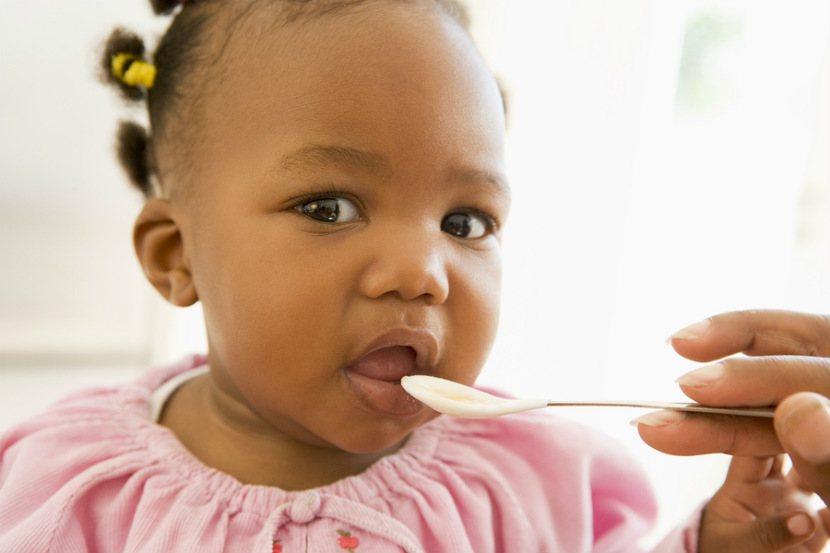
Many parents are interested in making homemade baby food. Find out how to get started and get tips on preparing baby food safely.
What’s the difference between homemade or store bought baby food?
Homemade and store bought baby foods are both good choices for your baby. They both have similar vitamins and minerals. Making homemade baby food means you can:
-
Use fresh and seasonal fruit and vegetables
-
Use foods from your culture and food traditions
-
Control the amount of sugar and salt you use
-
Save money
-
Adjust the texture of foods to suit your baby
Making homemade baby food
Before you begin, make sure to wash your hands with soap and warm water before handling food. Use clean utensils, counters and containers.
How to make baby food from vegetables and fruit
Preparing:
-
Choose fresh vegetables and fruit without bruises or blemishes. Thoroughly wash, peel, and remove the pit and seeds. Then slice vegetables and fruit into chunks.
Cooking: Place vegetables or fruit in a small amount of boiling water. Cook until tender. You can also cook by steaming or microwaving.
-
To steam, place food in a steam basket or colander above a pot of boiling water.
-
To microwave, place in a microwaveable container with a little bit of water.
After boiling, steaming or microwaving, drain the water and keep it in a separate bowl. After cooking:
-
Mash, mince, grind or puree soft cooked vegetables and fruits. Add a little bit of the cooking liquid to help get the right texture. You can add spices if you wish. Do not add salt or sugar.
-
Tip: Some soft fruits like bananas and peaches can be mashed and made into baby food without cooking them.
How to make baby food from protein foods
Preparing:
-
Choose meat alternatives like beans, peas, lentils or tofu. Choose unsalted plain ground beef, chicken, pork and fish like salmon, halibut, sole, haddock, tilapia and bass. You can add spices if you wish. Do not add salt or sugar.
Cooking:
-
Bake, poach or roast meat, chicken or fish until it is a soft cooked texture. Make sure it is thoroughly cooked. Flake fish with fingers to remove any bones.
-
Cook beans, peas and lentils from scratch. You can also use canned versions by rinsing and heating them up.
-
Stir fry, sauté, steam or fry tofu.
After cooking:
-
Puree, mince or grind the meat, chicken or fish. Add some liquid if you wish to get the right texture.
-
Mash, dice or puree cooked beans, peas, lentils or tofu.
Keeping homemade baby foods safe to eat
Storing baby foods:
-
Cover and refrigerate your homemade baby foods right away. They should not be left at room temperature for more than two hours.
-
Baby foods made of vegetables, fruit, legumes and tofu will keep in the fridge for two days.
-
Baby foods made of meats, poultry and fish will keep in the fridge for one day.
Freezing baby foods:
-
To freeze, pour or spoon prepared baby food into ice cube trays and cover with plastic wrap.
-
Once the food is in a solid cube, store in freezer bags for up to one month. Remember to label and date freezer bags.
Thawing baby foods:
-
Do not thaw baby foods at room temperature. Do not refreeze once it has thawed.
-
Thaw only the number of cubes needed for a meal. Thaw cubes in the refrigerator, in the microwave or a double boiler.
Serving baby foods:
-
Heat all baby foods thoroughly until they are steaming hot.
-
Cool before serving.
-
Any uneaten food should be thrown away.
Can I give my baby finger foods?
Yes. You can offer these foods as finger foods:
-
Soft cooked vegetables and fruit
-
Soft cooked tofu
-
Small (pea sized) pieces of tender meat or poultry
-
De-boned and flaked fish
-
Small beans (like black beans, navy beans) or larger beans cut in half (like kidney beans)
-
Pieces of egg
Tip: Avoid giving your baby raw or lightly cooked eggs that may be used in recipes like homemade mayonnaise, dressings and sauces.
You may also be interested in:
All about store bought baby food
Introducing solid food to your baby
Introducing solids to your baby: Safety tips
Food allergies and babies
Last Update – November 24, 2020